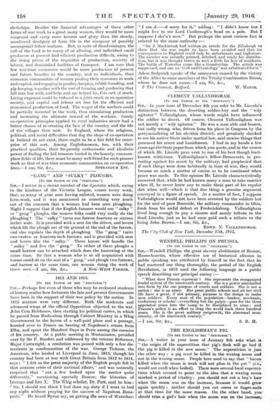1815 AND 1915.
[To ms EDITOR OF THE " SPECTATOR.1
Sin,—Perhaps few even of those who may be reckoned students of history realize how fortunate the late and present Governments have been in the support of their war policy by the nation. In 1815 matters were very different. Both the moderate and advanced wings of the official Opposition objected to the war, John Cam Hobhouse, then starting his political career, in which he passed from Radicalism through Cabinet Ministry in a Whig Government to the haven of a well-paid place and a peerage, hurried over to France on hearing of Napoleon's return from Elba, and spent the Hundred Days in Paris among the enemies of his country. At a public meeting in Westminster, presided over by Sir F. Burdett and addressed by the veteran Reformer, Major Cartwright, a resolution was passed with only a few dis- sentients in condemnation of the war. George Ticknor, the American, who landed at Liverpool in June, 1815, though his country had been at war with Great Britain from 1812 to 1814, says : " I felt as the great majority of the English people felt in that anxious crisis of their national affairs," and was naturally surprised that " not a few looked upon the matter quite differently," mentioning specially Roscoe, the historian of Lorenzo and Leo X. The W11;4; scholar, Dr. Parr, said to him.: " Sir, I should not think I had done my duty if I went to bed any night without praying for the success of Napoleon Bona- parte." He heard Byron say, on getting the news of Waterloo:
I am d—d sorry for it," adding : " I didn't know but I might live to see Lord Castlereagh's head on a pole. But I suppose I sha'n't now." But perhaps the most curious fact is related by the same authority :—
"Sir J. Mackintosh had written an article for the Edinburgh to show that the war ought to have been avoided and that its consequences to England could only be unfortunate and inglorious. The number was actually printed, stitched, and ready for distribu- tion, but it was thought better to wait a little for fear of accidents. The battle of Waterloo came like a thunderclap. The article was suppressed, and one on Gall and Craniology' was substituted for it."
Adam Sedgwick speaks of the annoyance caused by the victory of the Allies to some members of the Trinity Combination Room, whom he does not name.—I am, Sir, &c.,


















































 Previous page
Previous page